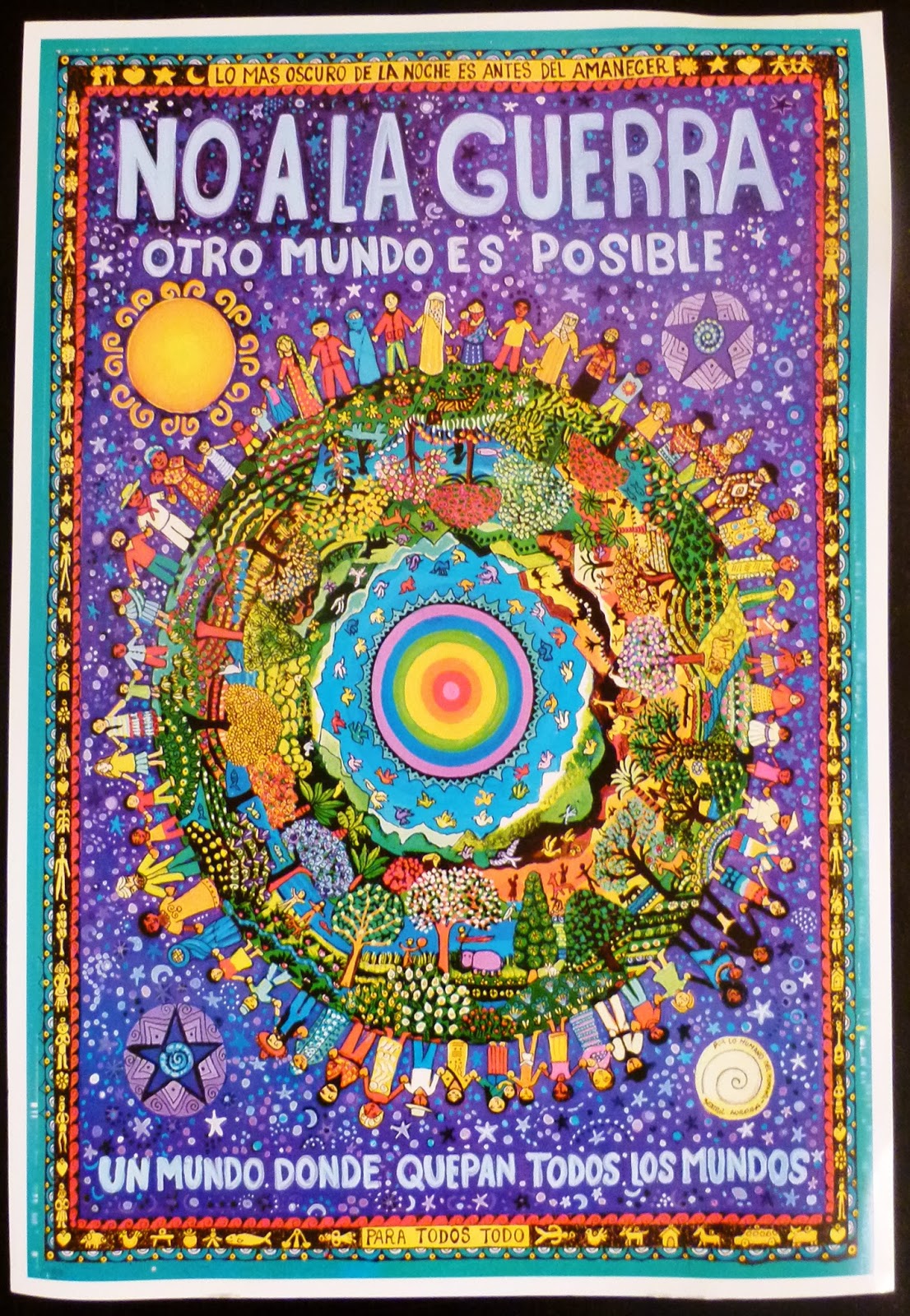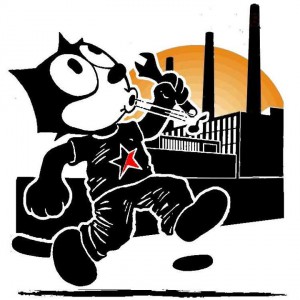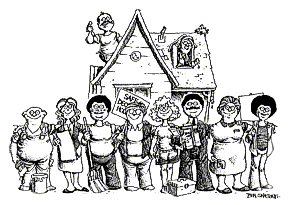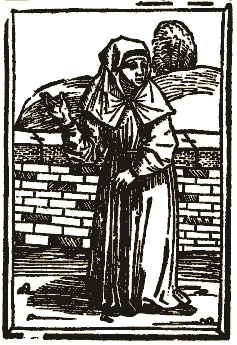A short story for children I helped to transcribe by elder Frances Chapman Crowe.
This is a story about an Aboriginal girl, called Noleen New, and her cousin Burgo Luck. She was a young pretty girl with skinny legs and her cousin, who has beautiful red-hair and cute freckles on his face. They both live on the same property belonging to Noleen’s Daddy. Noleen New and her cousin Burgo Luck thought eating juicy mulberries was delicious, but they couldn’t hide the mulberry juice on their hands. It is only through the help of Noleen’s wise Mummy, who helped them to overcome their shyness, that they learnt an important lesson.
Read the rest of this entry »
 After a day of preparation meetings for the Other Campaign (it was September, it was dawn, there was rain from a far-off cloud), we were heading towards the hut where our things were when we ran into a citizen who all of a sudden came out with: “Listen, Sup, what are the Zapatistas proposing?” Without even stopping, I answered: “Changing the world.” We reached the hut and began getting things ready in order to leave. Insurgenta Erika waited until I was alone. She approached me and said “Listen, Sup, the world is very big,” as if she were trying to make me realize what nonsense I was proposing and that I didn’t, in reality, know what I was saying when I’d said what I’d said. Following the custom of responding to a question with another question, I came out with: “How big?“
After a day of preparation meetings for the Other Campaign (it was September, it was dawn, there was rain from a far-off cloud), we were heading towards the hut where our things were when we ran into a citizen who all of a sudden came out with: “Listen, Sup, what are the Zapatistas proposing?” Without even stopping, I answered: “Changing the world.” We reached the hut and began getting things ready in order to leave. Insurgenta Erika waited until I was alone. She approached me and said “Listen, Sup, the world is very big,” as if she were trying to make me realize what nonsense I was proposing and that I didn’t, in reality, know what I was saying when I’d said what I’d said. Following the custom of responding to a question with another question, I came out with: “How big?“
Read the rest of this entry »
Published in “Wildcat” n°1
Ontario Coalition Against Poverty is a grassroots fighting organisation known for their contributions to the development of ‘Solidarity Network’ type actions and ‘Direct Action Casework’. Below is an interview I did with John a few years back.
 The essence of anarcho-syndicalism is shop-floor & neighbourhood level organising; the setting up of work groups that lay the basis for taking action to defend and extend our interests, and countering the drudgery and maddening pace of the global-work machine. These groups aim to be at once economic (based on shared material conditions) and political (based on shared political ideas). The setting up of work-groups is foundational in reigniting unionism as a pledge of solidarity among fellow-workers and in shaping broader resistance at the sites of power where we experience exploitation and hierarchy most directly. It’s important at this stage to note that regardless of whether people identify formally with anarcho-syndicalism or not, what matters is putting basic anarcho-syndicalist methods into practice, ie; our organisations, whether fluid, temporary or permanent, should ideally be controlled by the base, ultra democratic through the use of delegates and open assemblies regardless of official trade-union membership, direct-action orientated and be against intermediaries or organising methods which remove power from our hands.
The essence of anarcho-syndicalism is shop-floor & neighbourhood level organising; the setting up of work groups that lay the basis for taking action to defend and extend our interests, and countering the drudgery and maddening pace of the global-work machine. These groups aim to be at once economic (based on shared material conditions) and political (based on shared political ideas). The setting up of work-groups is foundational in reigniting unionism as a pledge of solidarity among fellow-workers and in shaping broader resistance at the sites of power where we experience exploitation and hierarchy most directly. It’s important at this stage to note that regardless of whether people identify formally with anarcho-syndicalism or not, what matters is putting basic anarcho-syndicalist methods into practice, ie; our organisations, whether fluid, temporary or permanent, should ideally be controlled by the base, ultra democratic through the use of delegates and open assemblies regardless of official trade-union membership, direct-action orientated and be against intermediaries or organising methods which remove power from our hands.
The following will outline one example (my own) of the nuts and bolts of this kind of organising in practice, set in the workplace. This will be accompanied by anarcho-syndicalist lessons/writings/ideas put forward by the Waiters Union (WU), Brisbane Solidarity Network (BSN), Solidarity Federation (SolFed) and the Industrial Workers of the World Recomposition Group (IWW) which I found helpful.
Read the rest of this entry »
“Family friendly” is a phrase that gets thrown around in activist circles with little to no thought, way too often. “Family friendly” has little to do with any actual real life family, and more to do with trying to make an event more conservative (liberal), non violent*, safe. It has little meaning beyond its use as code to signify that at this event some behaviours are acceptable/expected/enforced (e.g. listening politely to the speakers; following the directions of the marshals), and some behaviours are unacceptable (e.g. throwing wheelie bins at police; heckling boring speakers). “Family friendly” is code meant to appeal to middle australia – mum, dad, 2.3 kids. Apparently this is our target audience!?
Read the rest of this entry »
 I did this interview a while back with a Seattle Solidarity Network organiser. What are Solidarity Networks? The ‘Solidarity network’ is one way of organising which has the potential for dual power. In a nutshell, they are networks which span across different communities and different workplaces (regardless of unions or not), in order to support and connect struggles and build collective action. The principles behind solidarity networks rely on the balance of class forces, and recognise that sometimes we have to fight defensively because as a class we are weak, and this can’t be compensated for by small group actions ‘attacking’ back in whatever way (e.g. networks don’t firebomb dodgy real estates, they organise tenants to collectively assert their needs, even if that’s only defensively enforcing basic standards, because this builds the capacity, confidence and culture from which more ambitious demands can be made.)
I did this interview a while back with a Seattle Solidarity Network organiser. What are Solidarity Networks? The ‘Solidarity network’ is one way of organising which has the potential for dual power. In a nutshell, they are networks which span across different communities and different workplaces (regardless of unions or not), in order to support and connect struggles and build collective action. The principles behind solidarity networks rely on the balance of class forces, and recognise that sometimes we have to fight defensively because as a class we are weak, and this can’t be compensated for by small group actions ‘attacking’ back in whatever way (e.g. networks don’t firebomb dodgy real estates, they organise tenants to collectively assert their needs, even if that’s only defensively enforcing basic standards, because this builds the capacity, confidence and culture from which more ambitious demands can be made.)
Networks try to bring anyone affected by an issue together to collectively discuss the issue. The key is the self-activity of all of those concerned, to widen the fight, and encourage a state of permanent dialogue, planting the seeds for ongoing, relevant forms of organising which empower all of those affected; not just network members, but those who aren’t members of the network and who may never want to be. Read the rest of this entry »
 Baristas are putting up pressure on Starbucks Corporation to come to terms with 200 unionized workers in Chile who have been on strike for more than two
Baristas are putting up pressure on Starbucks Corporation to come to terms with 200 unionized workers in Chile who have been on strike for more than two
weeks.
Employees who belong to the IWW Starbucks Workers Union kicked off a “global week of action” on Monday in solidarity with their Chilean colleagues by picketing in front of a Starbucks in New York City. The following is a short interview with one IWW organiser (IU-660).
Read the rest of this entry »
Published in Wildcat#1
They Say Gentrify, We Say Occupy!
Rob is a solid organiser from Picture the Homeless and Take Back The Land with a wealth of knowledge around homeless peoples movements.
Read the rest of this entry »
An Introduction to Solidarity Networks Adapted from SeaSol’s ‘Why you should start a solidarity network’ Read the rest of this entry »
“The tendency to obey comes from systematic socialization of society that obedience constitutes correct conduct.” Read the rest of this entry »

A visitor to the Australian colonies in the 19th century remarked that the right to Australia was a sore subject among the settlers and that they always sought to satisfy their conscience in a number of ways. As an example here are a number of comments from papers at the time which sought to rationalise occupation and murder; they found their answer in the safety of ‘terra nullius’ – that diabolical lie that reduced people to the level of ‘flora and fauna’, not worthy of life.
Read the rest of this entry »
May 1st, International Workers’ Day, commemorates the historic struggle of working people throughout the world. The holiday began in the 1880s, linked to the battle for the eight-hour day and the Haymarket Affair, in which eight anarchists were framed and sentenced to death in connection to uprisings against the repression of active strikers.
“Never be deceived that the rich will allow you to vote away their wealth [and privilege].”
— Lucy Parsons, anarcho-syndicalist, founding member of the Industrial Workers of the World and widow to Haymarket martyr Albert Parsons
Read the rest of this entry »
Anyone who’s spent enough time on YouTube or Wikipedia (especially after a bit of choof) will eventually end up on one of the thousands of occasionally well-edited conspiracy theory rants. What I’ve been encountering seemingly more and more frequently (on the streets, at work – even with the taxi driver) are a plethora of ideas that add only to further mystify the way society works and disempower us through grand-hegemonic narratives that can never be proven or dis-proven.
Read the rest of this entry »
A dialogue around pacifism and non-violence by Peter Gelderloos. Now available in a smaller printable pamphlet
Read the rest of this entry »
 As a practice and over-arching worldview anarchism is fundamentally about sticking up for each other – against the whims of bosses, landlords and bureaucrats, against systemic and psychological systems of social control, against racism, sexism and other forces that hold illegitimate power over our lives. At the same time anarchist theory looks at how we can organise ourselves and our struggles in a way that reflects the kinds of society we want to see, and the nuts and bolts of doing this in such a way so that our movements can’t be demobilised or sold out from above, or used as trampolines for political careerists, NGO’s and those who seek to become managers over and above the people.
As a practice and over-arching worldview anarchism is fundamentally about sticking up for each other – against the whims of bosses, landlords and bureaucrats, against systemic and psychological systems of social control, against racism, sexism and other forces that hold illegitimate power over our lives. At the same time anarchist theory looks at how we can organise ourselves and our struggles in a way that reflects the kinds of society we want to see, and the nuts and bolts of doing this in such a way so that our movements can’t be demobilised or sold out from above, or used as trampolines for political careerists, NGO’s and those who seek to become managers over and above the people.
None of this theorising matters if we don’t try to implement our ideas beyond the realm of traditional Activist politics & propaganda and into the areas of our lives where we experience exploitation most directly: in our workplaces and neighbourhoods. Our situation in Queensland is one where strike action is basically illegal. Trade-Unions for the most part act as representative service organisations and NGO’s do – with all the rotten fruits of bureaucracy, paid officials and hierarchy. Most of the workforce have never been in or participated in union culture and there are not many opportunities to learn from struggle. In terms of organising, this sounds bleak; there is so much to do. When we look at significant fighting organisations like the CNT, the FORA, the IWW, the FAU etc, we have to look at how they developed and the organising that led up to them. The COBAS in Italy for example grew out of the workplace base assembly movement.
Read the rest of this entry »

The following is an interview with my Tony, who over the years I have known him has come to be more and more critical of the trade union, but from a perspective of militant worker organising and solidarity. Since Tony would rant a lot about this anyway, I asked if he’d be ok doing an interview so others could get a glimpse of what goes on in the meat industry (for a project at the time, The Grind). The following was transcribed from a recorded interview in Kangaroo Point back in late 2012.
Read the rest of this entry »
 This article will take a look at the following idea: A loss through Anarchist organising is worth more in terms of experience gained than winning through methods that take power out of your hands.
This article will take a look at the following idea: A loss through Anarchist organising is worth more in terms of experience gained than winning through methods that take power out of your hands.
Read the rest of this entry »
 NO HOMES WITHOUT PEOPLE // NO PEOPLE WITHOUT HOMES.
NO HOMES WITHOUT PEOPLE // NO PEOPLE WITHOUT HOMES.
Everything you need to know about squatting in QLD.
Over 2000 distributed!
Download here
Read the rest of this entry »
 We acknowledge our existence on land occupied by genocidal force and see prison abolition as one of the many starting points towards decolonisation and liberation.
We acknowledge our existence on land occupied by genocidal force and see prison abolition as one of the many starting points towards decolonisation and liberation.
Dedicated to the prisoners I’ve worked and struggled alongside with over the past five years, many of whom have suffered irreversible life-shattering trauma on the inside, some of whom have been killed in custody either by others or from their own hands.
And to Barry, who is still inside. His crimes: inter-generational trauma, fetal alcohol syndrome, poverty, loss of family and culture, homelessness, grief and trauma from his experiences in prison and the self-medicating alcoholism once he was released (and the revolving door which put him back inside).
Read the rest of this entry »
 As some of readers who enjoy left-trainspotting may know, Brisbane has a reputation for being a hot-bed for Christian anarchists. The mention of this term evokes a variety of responses, outrage, curiosity etc. Regardless of what you think, there’s so many of them in Brisbane that you’re bound to come across one eventually if you’re involved in any sort of campaign work. What follows are some of my notes from the Waiters Union 2 week community course back in 2010 and I aim to shine a bit of light on the Christi-anarchist milieu. The Waiters Union camp happens twice a year at the House of Freedom (this is also where BSN meet and has its library) and other locations across West End. Read the rest of this entry »
As some of readers who enjoy left-trainspotting may know, Brisbane has a reputation for being a hot-bed for Christian anarchists. The mention of this term evokes a variety of responses, outrage, curiosity etc. Regardless of what you think, there’s so many of them in Brisbane that you’re bound to come across one eventually if you’re involved in any sort of campaign work. What follows are some of my notes from the Waiters Union 2 week community course back in 2010 and I aim to shine a bit of light on the Christi-anarchist milieu. The Waiters Union camp happens twice a year at the House of Freedom (this is also where BSN meet and has its library) and other locations across West End. Read the rest of this entry »
 After a day of preparation meetings for the Other Campaign (it was September, it was dawn, there was rain from a far-off cloud), we were heading towards the hut where our things were when we ran into a citizen who all of a sudden came out with: “Listen, Sup, what are the Zapatistas proposing?” Without even stopping, I answered: “Changing the world.” We reached the hut and began getting things ready in order to leave. Insurgenta Erika waited until I was alone. She approached me and said “Listen, Sup, the world is very big,” as if she were trying to make me realize what nonsense I was proposing and that I didn’t, in reality, know what I was saying when I’d said what I’d said. Following the custom of responding to a question with another question, I came out with: “How big?“
After a day of preparation meetings for the Other Campaign (it was September, it was dawn, there was rain from a far-off cloud), we were heading towards the hut where our things were when we ran into a citizen who all of a sudden came out with: “Listen, Sup, what are the Zapatistas proposing?” Without even stopping, I answered: “Changing the world.” We reached the hut and began getting things ready in order to leave. Insurgenta Erika waited until I was alone. She approached me and said “Listen, Sup, the world is very big,” as if she were trying to make me realize what nonsense I was proposing and that I didn’t, in reality, know what I was saying when I’d said what I’d said. Following the custom of responding to a question with another question, I came out with: “How big?“ The essence of anarcho-syndicalism is shop-floor & neighbourhood level organising; the setting up of work groups that lay the basis for taking action to defend and extend our interests, and countering the drudgery and maddening pace of the global-work machine. These groups aim to be at once economic (based on shared material conditions) and political (based on shared political ideas). The setting up of work-groups is foundational in reigniting unionism as a pledge of solidarity among fellow-workers and in shaping broader resistance at the sites of power where we experience exploitation and hierarchy most directly. It’s important at this stage to note that regardless of whether people identify formally with anarcho-syndicalism or not, what matters is putting basic anarcho-syndicalist methods into practice, ie; our organisations, whether fluid, temporary or permanent, should ideally be controlled by the base, ultra democratic through the use of delegates and open assemblies regardless of official trade-union membership, direct-action orientated and be against intermediaries or organising methods which remove power from our hands.
The essence of anarcho-syndicalism is shop-floor & neighbourhood level organising; the setting up of work groups that lay the basis for taking action to defend and extend our interests, and countering the drudgery and maddening pace of the global-work machine. These groups aim to be at once economic (based on shared material conditions) and political (based on shared political ideas). The setting up of work-groups is foundational in reigniting unionism as a pledge of solidarity among fellow-workers and in shaping broader resistance at the sites of power where we experience exploitation and hierarchy most directly. It’s important at this stage to note that regardless of whether people identify formally with anarcho-syndicalism or not, what matters is putting basic anarcho-syndicalist methods into practice, ie; our organisations, whether fluid, temporary or permanent, should ideally be controlled by the base, ultra democratic through the use of delegates and open assemblies regardless of official trade-union membership, direct-action orientated and be against intermediaries or organising methods which remove power from our hands.




 This article will take a look at the following idea: A loss through Anarchist organising is worth more in terms of experience gained than winning through methods that take power out of your hands.
This article will take a look at the following idea: A loss through Anarchist organising is worth more in terms of experience gained than winning through methods that take power out of your hands. NO HOMES WITHOUT PEOPLE // NO PEOPLE WITHOUT HOMES.
NO HOMES WITHOUT PEOPLE // NO PEOPLE WITHOUT HOMES.

 As some of readers who enjoy left-trainspotting may know, Brisbane has a reputation for being a hot-bed for Christian anarchists. The mention of this term evokes a variety of responses, outrage, curiosity etc. Regardless of what you think, there’s so many of them in Brisbane that you’re bound to come across one eventually if you’re involved in any sort of campaign work. What follows are some of my notes from the Waiters Union 2 week community course back in 2010 and I aim to shine a bit of light on the Christi-anarchist milieu. The Waiters Union camp happens twice a year at the House of Freedom (this is also where BSN meet and has its library) and other locations across West End.
As some of readers who enjoy left-trainspotting may know, Brisbane has a reputation for being a hot-bed for Christian anarchists. The mention of this term evokes a variety of responses, outrage, curiosity etc. Regardless of what you think, there’s so many of them in Brisbane that you’re bound to come across one eventually if you’re involved in any sort of campaign work. What follows are some of my notes from the Waiters Union 2 week community course back in 2010 and I aim to shine a bit of light on the Christi-anarchist milieu. The Waiters Union camp happens twice a year at the House of Freedom (this is also where BSN meet and has its library) and other locations across West End.